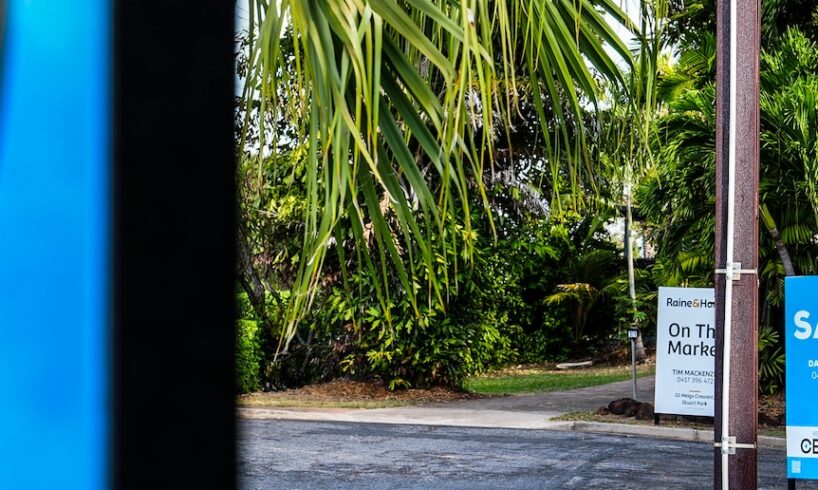
Interstate investors are targeting properties across the Northern Territory and buying them up hours before they hit the market, as Darwin’s rental market firms as the tightest in the country.
Local doctor Nicolas Darmanthe moved to Darwin at the beginning of the year with his partner, and thinking they would be able to afford to rent a “fairly nice” three-bedroom home.
But, after a few months of looking in a city where the vacancy rate is just 0.3 per cent, they realised that wouldn’t be the case.
“Even though Darwin is very far away and [like] a small country town, it turns out the rentals are just as expensive — if not more expensive — than down south in Canberra and Sydney,” he said.
Nick Darmanthe thought rental properties would be affordable in the Northern Territory when he moved up to Darwin from Canberra. (ABC News: James Elton)
Over the past year, interstate investors have increasingly turned their focus to the NT, where houses and units remain among the most affordable to buy in the country and rental yields are among the highest.
Real estate agents have told the ABC they can sell homes to interstate investors “within hours”, often before they are publicly advertised, with some saying the fierce competition to sell properties fast has left them no choice but to play along.
Nick Mousellis, an independent real estate agent in Darwin, first started getting calls from interstate investors about a year ago and now fields numerous requests a week.
Nick Mousellis has been a real estate agent in Darwin for more than three decades. (ABC News: Marcus Kennedy)
“Almost every two to three days, we have an inquiry or an e-mail from a buyer agent,” he said.
Over the past year he’s seen an increase between 3 and 10 per cent in Darwin property prices, and soaring competition for local homes.
“People are missing out … I haven’t seen this sort of activity for quite a while,” he said.
Mr Mousellis said interstate investors were targeting homes priced between $500,000 and $650,000, spending a small amount on renovations, and then leasing them at a higher price.
A landlord’s market
Nicola Powell, chief of research and economics at Domain, said the sudden flood of interstate buyers had positioned the NT as an investment hotspot — second only to New South Wales.
Interstate investors are increasingly looking to Darwin properties, which is driving up the cost of renting in the NT. (ABC News: Ian Cutmore)
“[Rental] house yields are sitting at around 6 per cent, and [rental] unit yields are anywhere between 7 and 8 per cent,” she said.
“Compare that to a market like Sydney — where rental yields are sitting at 3 per cent — you can understand why investors are looking towards those cash positive locations like Darwin.”
Darwin’s 0.3 per cent vacancy rate compares with a national rate of between 2 and 3 per cent, according to Domain’s June Quarter Rent Report.
Unit rents are at record highs across all capital cities including Darwin and, while house rents remain at record highs in all capitals, prices in Darwin dropped $20 in June.
Dr Powell said interstate investors had the ability to revitalise stagnant markets but, in this case, they were likely “nudging first home buyers” out of the market and making it harder for people to secure an affordable rental.
Dr Nicola Powell says Darwin is experiencing a rental crisis. (Supplied)
“We do have a rental crisis,” she said.
“When you’ve got a vacancy rate that is very tight at 0.3 per cent … it means it is very competitive for tenants — to have a balanced rental market, you need that vacancy rate to be between 2 and 3 per cent.
“You tend to find that investors and first-time buyers go for similar priced properties.
“That makes it more challenging for a first-time buyer to break into the market, because ultimately a first-time buyer doesn’t have as deep pockets as an investor does.”
Unaffordability linked to supply
Ruth Palmer has been the executive director of the Property Council of Australia’s NT division for over a decade and said she hadn’t seen a “shift” quite like this before.
She said Alice Springs had seen a “significant jump” in median house prices and improvement in the volume of sales.
Ms Palmer said, with both sales and building approvals up, many NT real estate agents now had “a bunch of investors on their books who are chasing properties”.
Property Council of Australia’s Ruth Palmer says the NT needs to increase housing supply. (ABC News: Hamish Harty)
“Sometimes the properties don’t even get to market before they’re snapped up by an investor, and this can occur within about 24 to 48 hours,” she said.
“What this can do is put a bit of an imbalance into the market, so while our volume sales are up and while we’re seeing a lot of transaction, it doesn’t exactly mean that it’s growing the population.
“It obviously brings in that squeeze on the rental market, and drives up prices in that space as well.”
Ms Palmer said, as the NT continued to face high construction costs and a shortage of tradies, more needed to be done to “stimulate new builds”.
“Without more supply, affordability will remain a challenge,” she said.
In the March 2025 quarter, building approvals rose over 50 per cent compared with the previous quarter, according to the Property Council’s latest report.





